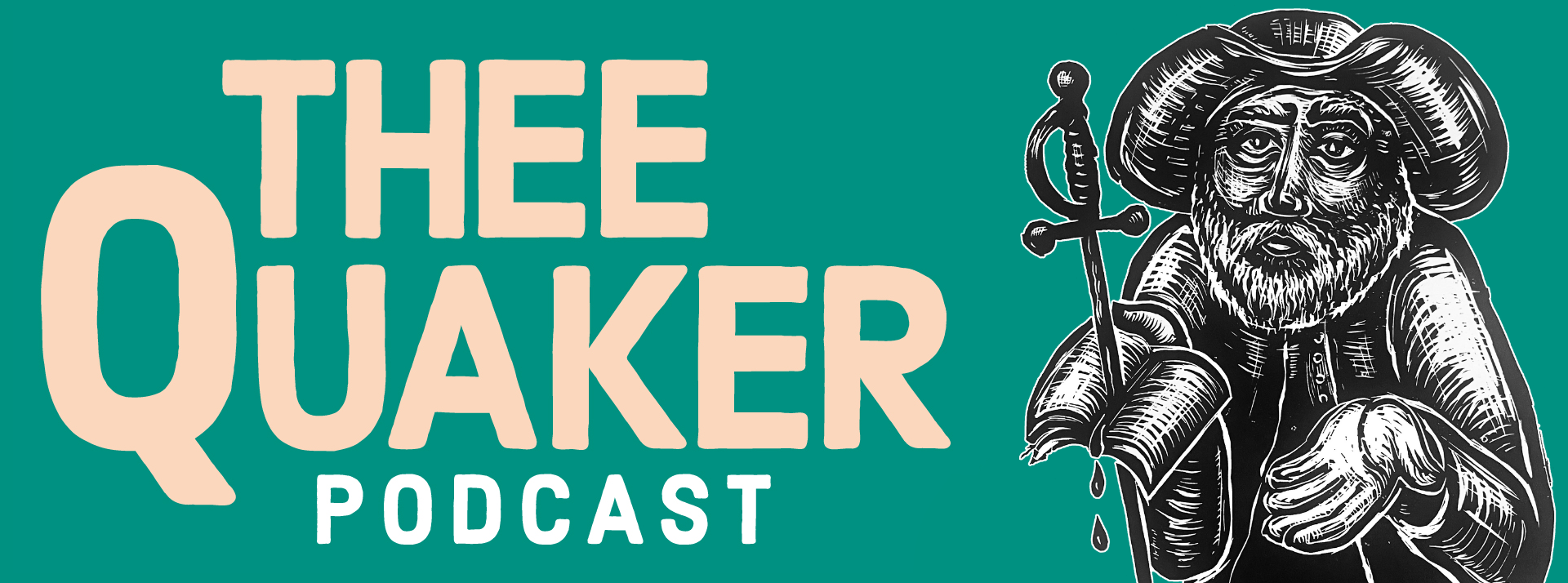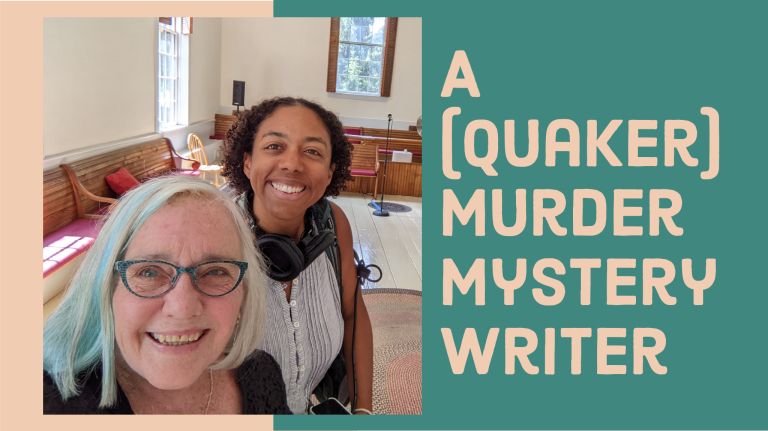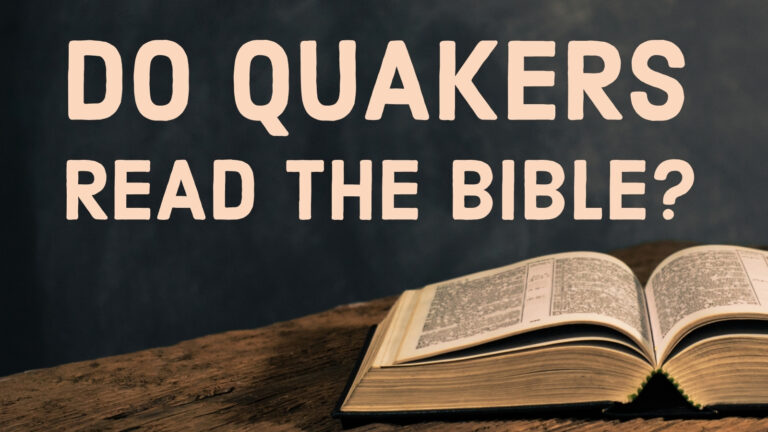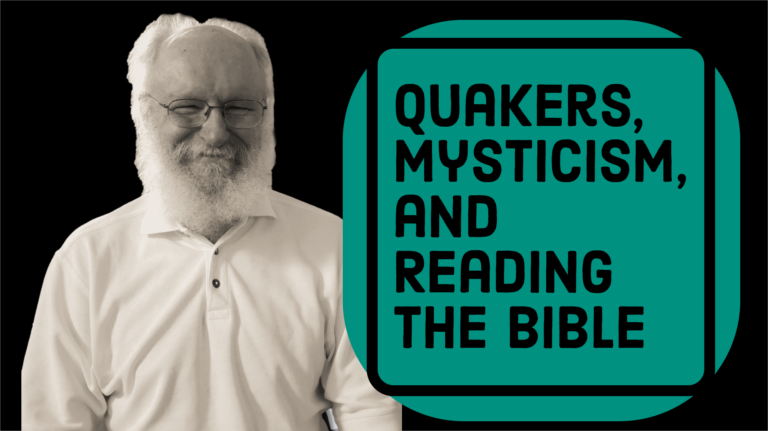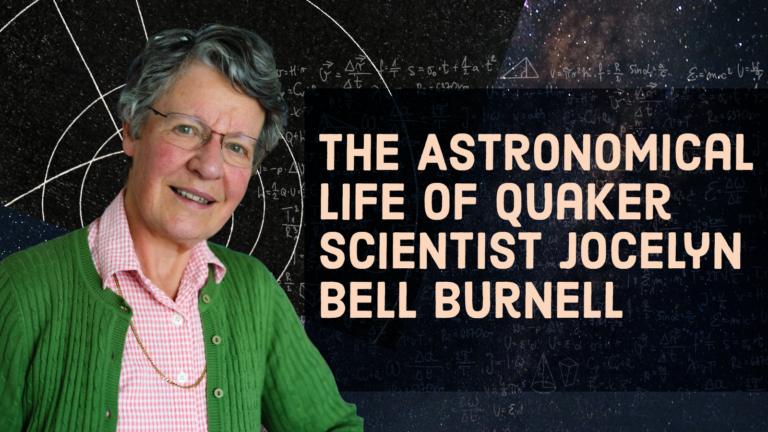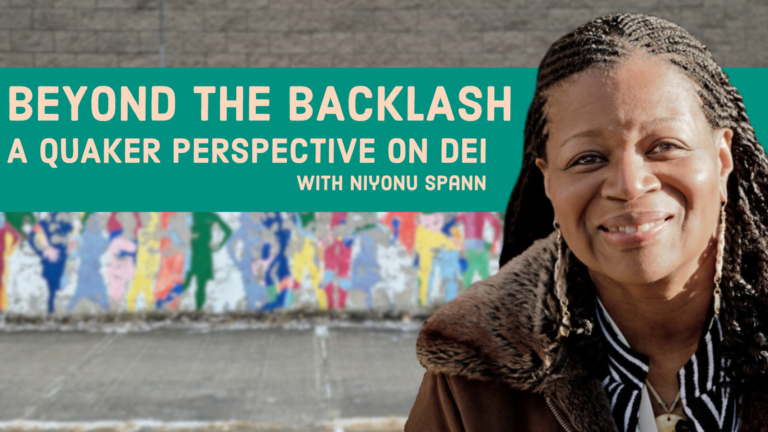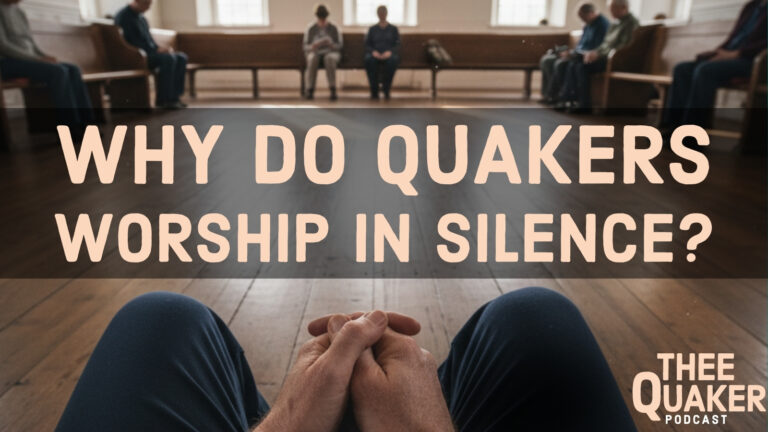A Quaker Response to Crisis with Eileen Flanagan
Quaker author and activist Eileen Flanagan joins us to explore the wisdom that she has learned from her decades of experience in organizing around the climate crisis, and how that very crisis is exposing the “illusion of separation” in our times. Eileen helps us move beyond individual conviction to creating effective and diverse coalitions for positive social change.
“Common Ground: How the Crisis of the Earth is Saving Us from Our Illusion of Separation” by Eileen Flanagan
Subscribe so you don’t miss an episode!
Leave a comment below to share your stories and thoughts!
Westtown School is a Quaker, college preparatory day and boarding school for students in pre-kindergarten through twelfth grade, located in West Chester, Pennsylvania, United States. Guided by the essential Quaker calling to seek out and honor that of God in each of us, Westtown School challenges its students to realize their individual gifts while learning and living together in a diverse community. Their campus sits on 600 acres of land that includes a 14 acre lake, an arboretum and natural forest, and an instructional organic farm.
Learn more and schedule a visit at www.westtown.edu.
Discussion Questions:
- The subtitle of Eileen’s book is “How the Crisis of the Earth is Saving us from Our Illusion of Separation”. Where do you see the “illusion of separation” in our world, and in what ways (if any) do you see the climate crisis revealing our interconnection?
- Eileen describes the four roles of social change: Helper, Advocate, Rebel, and Organizer . Which role do you feel most naturally drawn to? Which one feels the most challenging or uncomfortable for you, and why?
- What do you think is the primary role of a local spiritual community, like a Monthly Meeting, in this moment? Is it to organize corporate action, or, as Eileen suggests, to spiritually support individuals doing bold work “out in the world”?
Eileen Flanagan
The Quaker language that speaks to me is feeling under the weight. If you really feel under the weight of an injustice, you’re going to act in a different way, I think, with a sense that what you do is important, and that trying to do something that might make a difference is important, not just doing something symbolic, you know, like the bumper sticker is not going to cut it if you really feel under the weight, I’m not against bumper stickers. I’ve had plenty, but you know what I’m saying?
Zack Jackson
Hey, friends. Zack here.
We hear all the time that we’re living in a divided age. But what if our separation is just an illusion? And what if the very crisis of the Earth could actually save us from that illusion?
That’s the provocative idea from my guest today, Eileen Flanagan.
She’s a Quaker activist, author, and non-violence trainer who is currently traveling the country promoting her new book and giving people real, actionable tools to combat the environmental and societal crises we find ourselves in.
Here’s our conversation.
Eileen Flanagan
My name is Eileen Flanagan. I’m a member of Chestnut Hill Meeting in Philadelphia, where I have a minute of religious service to support my work as a writer, a teacher, an activist, a trainer, trying to follow Spirit in this crazy period. And a lot of my work has focused on climate change, but also skills of non violence that can be used on other issues as well.
Zack Jackson
Your work is so important right now, both in terms of organizing around the climate and organizing against authoritarianism and simply organizing in general, building coalitions among disparate groups of people who all have a common interest. And I think the subtitle of your book “Common Ground”, which is how the crisis of the Earth is saving us from our illusion of separation. That struck me so hard, I said, oh my goodness, I really hope that she’s right.
Eileen Flanagan
Well, and I’ll just say on that subtitle, I hope it’s right too. But that line actually came from Spirit. That was the impetus of this book. It was a spiritual message, and it’s the thread that continued through a long journey of writing. The book was this idea of the illusion of separation and the ways that the climate crisis, but also the pollution crisis and the biodiversity crisis, there’s so many aspects to what’s happening on the earth that are revealing our interconnection with each other and with other spirit species. I almost said spirit, which is also a level of it for me.
Zack Jackson
So why this book? And why now?
Eileen Flanagan
Well, I do feel like Spirit decided it would be published now. I would have been happy if it had been published five years ago, or maybe even six. You know, I was eager to write it quickly, because climate change is urgent, so I should get it out there. But things kept happening, COVID, which is a brief chapter in the book, because many of the lessons of COVID are parallel. You know, we’re all affected, but not equally things like that. It was definitely a lesson in the illusion of separation, right? Things kept happening that changed the book a little, and that took longer, but in hindsight, I I think why this book was because that message had resonated so deeply that when I started feeling like I wanted to write another book that was just the idea that was clearly there, the timing now feels to me perfect, because so many lessons in the book relate to the struggle against authoritarianism. You know, of how people can connect, the power of non violence strategies, the power of listening to spirit. I think there’s a lot in it that feels perfect for this time. So it’s a reminder to me about being impatient, which is probably my biggest spiritual struggle.
Zack Jackson
You’re in good company. I feel like that’s a pretty common struggle.
Eileen Flanagan
I don’t have a monopoly on it, for sure, but I will say it’s actually one of the lessons of the book. There’s a few chapters that feature indigenous led struggles, and one of the things I’ve really appreciated and learned from indigenous people is a worldview that emphasizes the long term. You know, I think any of these issues, whether it’s protecting democracy or protecting the climate, we have this sense of urgency that is not made up. You know, there are good reasons for it, but there’s also a wisdom that comes from taking the long view of things.
Zack Jackson
I understand that there’s wisdom in that balance, but I will also admit to struggling with that, with that wisdom, because it does feel like I don’t have time to think about what is going to be the effect seven generations down, when my children are affected by this and that I need immediate action, and I need to go out and lock myself up to an oil rig or something to get them to stop drilling, you know, and I don’t know how to be patient and not be frustrated and hopeless.
Eileen Flanagan
Yeah, there’s a lot in there that I think resonates with a lot of people right now. So I just want to tease it apart a little bit. The indigenous led struggles I’m thinking about did have people going and chaining themselves to the equipment. So taking a long view doesn’t mean that you don’t feel the urgency of acting now, it might actually make you feel more urgent about acting. Now, if you understand, you know what the impact on seven generations will be. So it’s not like I said patience. I think there’s a difference between being impatient with things that just naturally need time to evolve. That’s different than the kind of impatience with injustice, right? I just want to make that distinction. Dr King wrote in Letter from a Birmingham Jail about being criticized for, like, you know, being impatient to stop racism. And he was like, no, no.
So, so there is something about feel that the Quaker language that speaks to me is feeling under the weight, if you really feel under the weight of an injustice, you’re going to act in a different way, I think, with a sense that what you do is important, and that trying to do something that might make a difference is important, not just doing something symbolic you I think the importance in the organizing of patience comes in more in things like relationship building. You’re not going to build any kind of coalition across differences, especially painful or historic differences, being impatient
So I’ll tell a quick story. I went out to line three, which, for people who don’t know, was a pipeline built across northern Minnesota. In many ways, the campaign to stop this pipeline was similar to Standing Rock. It was led by indigenous people and many, many 1000s of people from different indigenous nations and non Indigenous people came as allies to support this campaign. I felt led to go out to this camp, both to be a participant and to write about it in the book. And when I arrived, I told the camp leader, Sasha. All the camps were led by Ojibwe women. And I was like, Hi, I’m a non violence trainer. If you need any trainings, just let me know. And she was like, great, clean the kitchen like we don’t. You know, you white lady who just got out of a car? You know? And I was like, Oh, of course. Okay, so I cleaned the kitchen and I signed up for port a potty duty, you know. And it was, I think, around day 10 or something, I ended up leaving and then coming back.
But the day that I was leaving for the first time, unbeknownst to us, the pipeline drill arrived at the Enbridge site, the company right next to where we were camping. And so there’s all these people there to protect the water, to protect the land, doing ceremonies, doing sweat lodges. So it’s this moment of fear and urgency, and more people were coming from different camps in order to do direct action, and I had to go, and felt terrible about leaving at that moment, so I consulted with this other person and said, Could we stay a little longer? And she said, Yeah, we could stay a few more hours. So I went back to Sasha, the camp leader, and said, you know, we’re leaving, but if you wanted me to do some kind of non violence training like I could stay an extra couple hours. So then, after 10 days of me cleaning the toilets, Sasha stood up and said, Eileen is leading a non violence training in five minutes. Everybody go, take a break and come right back. And so that was a moment where I felt well used. I felt like what I mostly offered that group was grounding for a few days that ended up being really brutal, and I couldn’t have done it on day one, because nobody trusted me, right? And 10 days is a short period of time, but if you’re camping with people and eating every meal together, you know? So if you’re not camping with people, translate that 10 days into some longer period of relationship building. So that’s part of what I mean about having a longer vision and not just coming in with my to do list.
Zack Jackson
After the break, Eileen gets practical, explaining the unexpected way that Earth Quaker action team is taking on the fossil fuel industry and the various roles that people can fill in this movement. Stay tuned.
Zack Jackson
I recently had the pleasure to visit Westtown School, a Quaker day and boarding school in West Chester, Pennsylvania, just west of Philadelphia. I was there to talk to Chris Wills, the Assistant Head of School, but instead of taking me on a tour of one of their world class academic buildings, he wanted to show me the land itself. So our first stop was to one of the school’s oldest residents, Grandmother Maple.
Chris Wills
Grandmother Maple is this tree that we use predominantly in our “farm and forest program”, which is our lower school science curriculum, and I think what’s particularly special about that program is that it’s really emphasizing for students to build this natural connection with the world. And so when students come and get to meet Grandmother Maple, they come here in first grade, and what they always do is they come up and they put their hand on the tree as a way to introduce themselves to it, and to feel like the living nature of the tree as well.
Zack Jackson
Chris explained that this simple act, this connection to nature, isn’t just a science lesson. It’s the foundation for everything that they do.
Chris Wills
I always say the learning at Westtown is really about relationships. It’s about relationships with yourself, relationships with other students, relationships with ideas, and then relationships with the natural world.
Zack Jackson
As we walked along the wooded trails of their 600 acre campus and marveled at the kingfisher swooping over the lake, Chris explained that Westtown is a place where diversity is celebrated, and the students who represent 20 states and 19 countries are given the space to discover new perspectives.
Chris Wills
I think it leads to all of these really incredible conversations in classrooms too. So my understanding of an issue is going to be informed by the fact that I’m an American citizen, but you know, my neighbor, who might be from Korea, could have a totally different experience and a different way of approaching a particular topic or concept, so that we can really learn from each other and kind of test that idea of what is truth and how can we expand wisdom.
Zack Jackson
As we emerged from the forest and back into the heart of their busy campus, Chris summed up why this connection to the land is so central to building a healthy human community.
Chris Wills
We can see the diversity that exists within this landscape to better understand all of the different ecosystems, how all of these different parts really rely on one another in order to form sustainable systems. And so learning from those kinds of things allows us to really be able to translate those ideas into human-scale kinds of things as well.
Zack Jackson
If that kind of deep, intentional community is what you want for your child, then I encourage you to visit westtown.edu where you can learn more and schedule a visit. And you should definitely schedule a visit. It is a truly beautiful campus. So again, that’s westtown.edu W, E, S, T, T, O, W, N.edu
And now, back to the show.
Zack Jackson
Can you tell us about Earth Quaker Action Team, sort of where it came from. What is the driving mission behind it? What are your tactics? What? What should we know about this organization?
Eileen Flanagan
Earth Quaker Action Team grew out of a gathering of Philadelphia Yearly Meeting in 2009 that had a theme. I think it might have also been around right relationship, but definitely climate change and environmental concerns were one of the major topics. And George Lakey gave a talk. And this relates a little bit to what we were saying before about the urgency thing for those who know George, he is a long, long time peace and justice activist who has a sense of urgency about the times, right? And he had for decades been trying to convince Quakers to do more non violent direct action, things like civil disobedience, and was disappointed that they hadn’t. And before this talk, not many people know this story. Before this talk, he had a sort of internal letting go process. And he was like, You know what? They might not listen. All I can do is make my best case. And so instead of kind of finger wagging at Quakers. He just came with this beautiful message of, if we really believe climate change is going to be catastrophic, maybe we should try some tactics that have worked historically. And he told amazing stories about Quakers being brave and putting themselves in the way of injustice. And it was, it was very moving. It was like people felt Spirit in the room.
And during the sharing afterward, there were people who stood up and said things like, show us the way we want to hear like, what is the most radical thing that we could do to work on this issue? And out of that, a small group of people got together and chose the mission of working for a just and sustainable society using nonviolent direct action. So that’s really our core and our niche so far has been taking on corporations that are profiting from climate destruction. And challenging them directly. So we do do civil disobedience from time to time, but not all of our actions risk arrest. At FGC gathering that was at Haverford in 2024 we had 300 people walk up the road and sit down and have meaning for worship in Vanguard’s driveway. And so we’ll have tactics like that that are disruptive but in a non violent way. And it was really powerful worship. Many people shared that experience of it. Sometimes we visit decision makers in their homes, kind of in the spirit of Jon Woolman. I’m going to speak to that of God in you and point out all the things you’re doing that are not in alignment with that.
So we use a variety of tactics, and in the Vanguard campaign, moving money is one of them. We’re finding more and more organizations are starting to move their money out of Vanguard, along with many individuals, as an act of integrity, but also collective action to pressure this institution that is the biggest investor in fossil fuels in the world. It’s been also a powerful campaign for me, personally, because I was finishing this book research and found out that every one of the companies people were fighting in the places I visited, Vanguard was either the top investor or one of the top ones. So another illusion of separation is that our money is not in things that we don’t believe in. You know, we are connected on many, many levels, and financially is one of them?
Zack Jackson
Yeah, that is, that is a really good point. I’m wondering about people that want to get involved, people whose hearts have been moved, they feel the call of the movement of the Spirit to get out and do something about this. Could you share with us a little bit about the different roles that are out there for people that want to get involved.
Eileen Flanagan
Sure, there are different frameworks with different terminology. The one you’re probably referring to that was part of the founding of EQAT is the framework of the four roles of social change, which was based on research about successful movements, and it was observed that all of these roles showed up in movements that were successful.
So one is called the helper, and that could be if you think of the civil rights movement. There are now books coming out by the women who made all the meals for all the marchers, right? So it could be feeding the hungry in your community, because Medicaid just got cut, you know, but it could also be feeding activists or being medics, you know, basic care of people, but the helper also is basically helping on an issue without taking on the system. So for climate change, it could be people building rain gardens or getting their local meeting to put solar panels up, or, you know, things. There are so many things that we can do alone and especially together, that make a difference without necessarily taking on the entire fossil fuel industry, right? So the helpers that’s their niche.
Advocates are taking on the system, but using the tools of the system. So FCNL is an excellent example of an effective advocacy organization.
Zack Jackson
Can you tell us what that stands for?
Eileen Flanagan
Yes, the Friends Committee on National Legislation, thank you for slowing me down. Or FCNL is a great example of an advocacy organization, because they use lobbying, they visit politicians, they build relationships around Quaker concerns, and that’s important. You know, legislation is important, and that isn’t enough alone, because so many of our representatives are taking money from the fossil fuel industry.
So then you have the rebels, which is what EQAT was founded to be a rebel organization. We saw other Quakers were playing the other roles, and so we’re the block the driveway people or the show up in a more challenging way. So for us, it’s challenging, grounded in love and spirit, but it’s still challenging. We’ve interrupted a few corporate shareholder meetings, for example, with singing or, you know, with words or whatever. But we’re not going to necessarily wait until they call on us at the end. We’re going to assert it, you know. So that’s part of the rebel role, is to create pressure by raising the issues in a way that makes it hard for decision makers to continue with business as usual.
And then the last role is called the organizer, and the organizer is really able to play any of the other roles, but their orientation is bringing people together. So at heart, I’m really more of an organizer, but I found my place in a rebel group, but building relationships between individuals, but also between groups, is part of what an organizer is jazzed about.
Zack Jackson
So there are certain roles that you feel more naturally called to, but you can float between these as the time demands.
Eileen Flanagan
Yeah, absolutely. And I do think all of them are valuable. They’re all needed. And I also think that many of us were trained to be helpers or advocates. Those are kind of, you know, what I learned in Girl Scout camp or or in Catholic school or whatever. You know, not that many families raise their kids to be rebels, and so I think it takes a little more discernment sometimes for people to realize like, oh, I’m actually feel, feel called to do this thing that is really against how I was socialized. So for example, when EQAT has gone to visit decision makers when we first started doing that, many activists call it bird dogging when you kind of personally pressure. And Quakers didn’t like that. It sounds violence or hunting or something. You know it was. So we, we reframed it as spotlighting, and so we’re gonna go and shine a light on what people are doing. But many people have said like, Oh, I was raised middle class, and we don’t confront people, you know, that spiritually, I have to do some work to follow this leading. And that’s been true for me too. I wasn’t, I wasn’t raised to interrupt CEOs, you know?
Zack Jackson
Yeah, and there seems to be two different avenues of this. There’s the internal prophetic work where you are sort of maybe frustrated that the people on in your particular inside group don’t feel the same fire that you do, and you need to rally your own troops. I mean, not to use a military metaphor here. And then there’s the sort of prophetic fire against the perceived injustice that when you’re trying to convince your meeting to take action is a different sort of prophetic voice than when you’re trying to convince Vanguard to do it.
Eileen Flanagan
Yeah, and I think I’ve been thinking a lot about what is the role of our monthly meetings in these times, and I think the primary role of our monthly meetings is to spiritually support people to listen to spirit and do bold things that they may or may not do with other meeting members, right? So, I mean, just I mentioned the pillars of power, Daniel did a slideshow recently where he had drawn all these pillars of power of authoritarians, like the business community, like the federal government, like universities, like there’s a whole bunch of them. And when I looked at it, I thought there are people in my monthly meeting, in every one of those, except the military, right? So we might have people who the bold thing they feel led to do is to disobey at work, right? Or to challenge. You know, in their professional role, if you’re a university administrator, you’re under so much pressure right now to cave right and are we as friends, ready to support those people and give them clearness committees and challenge them a little bit?
You know, I think that’s really, really important. I think there are some kinds of social action that a monthly meeting could do. A monthly meeting could definitely put solar panels up. A monthly meeting might be able to take in a refugee family and provide sanctuary, although, by the way, don’t put it on your website. I think we have to realize that, no, this is the first time in history that Quakers might be playing this kind of sanctuary role since the internet. I don’t think we’re thinking enough about how to make sure people are safe that we’re not just posting our minutes everywhere, but that said that’s the kind of thing I’m meeting. So a meeting can form like my own meeting is trying to help inform people about other opportunities for activism. They’re starting a listserv. So if you want to go to the big March, you can go with meeting members and carry a Quaker banner. I think that’s all great. But other kinds of direct action, like the kind that EQAT is doing. I don’t think monthly meetings are set up to be those vehicles. And so EQAT was not formed under any meeting. It was people from a bunch of different meetings who felt the same, leading, who found each other and came together. And I think we’re going to need some of that during this period. There are going to be people who have a leading to maybe go worship outside of ICE. Maybe they’re going to feel led to go visit those ICE members at their houses, in the spirit of Jon Woolman, not as doxing, but as challenging. You know, what is it doing to your spirit to rip families apart? I don’t know. Maybe people will feel bold to do that sort of thing, they’re never going to do it if they wait for their monthly meeting to approve it, those folks are going to need to find each other and then have their monthly meeting, praying for them hard.
Zack Jackson
As we sort of wrap up our time together, your book is coming out as we record this, it’s coming out next week. You have your launch party tomorrow, and then you are going on the road for a number of months to do trainings and do talks and to promote the ideas within. As you send this out into the world to be received. And you know, you obviously don’t have any control over how your work is received. What are your sort of hopes and dreams for it? What do you hope that it does out in the world?
Eileen Flanagan
Oh, thank you for that question. No one’s asked that. I hope it encourages people to find their peace in a group. There’s been a lot for a long time, of Quakers carrying their reusable water bottles and doing various things right to try to live more lightly on the earth, and that’s great, but that is not going to transition us off of fossil fuels when the Exxons of the world are giving so much money to our politicians. So whichever level you feel led to work with, even if it’s doing the conservation stuff like find a group of people to do it with, I think if there’s one thing I would want people to do, it would be that
Zack Jackson
Thank you for listening, and thank you to my guest Eileen Flanagan. Check out our website at Quakerpodcast.com for discussion questions, a transcript of today’s episode and links to more resources. Make sure you subscribe so you don’t miss a thing this season. This episode was hosted, produced and edited by me, Zack Jackson. Jon Watts, wrote and produced the music. Thee Quaker Podcast is a part of Thee Quaker project. We are a nonprofit Quaker media organization dedicated to giving Quakerism a platform in the 21st Century. If you like what we’re up to, please consider becoming a monthly supporter. You can go to Quakerpodcast.com and click support in the top right window. It takes less than five minutes, and we really appreciate it. And now our daily Quaker message as read by Damon Williams.
Damon Williams
Gerald Littleboy, 1945. For some it is right to give their whole lives explicitly to concrete forms of service, but for most their service will lie ‘in the sheer quality of the soul displayed in ordinary occupations.’ Such ordinary occupations are sometimes an essential contribution to the liberation of another person for wider service, and in any case, the inspiration of a dedicated life lived in simple surroundings, though often untraceable, may be profound in its reach.
Zack Jackson
To get Quaker wisdom in your inbox every day, go to dailyquaker.com that’s dailyquaker.com.
Hosted, produced, and edited by Zack Jackson.
Original music and sound design by Jon Watts (Listen to more of Jon’s music here.)
This season’s cover art is by Todd Drake
Supported by listeners like you (thank you!!)
